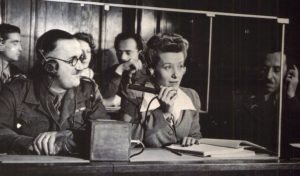Languages of Internationalism, 24-26 May 2017, Birkbeck College
 Organised in collaboration with Dr. Brigid O’Keeffe from Brooklyn College, CUNY, the Reluctant Internationalists project’s final conference will bring together historians, anthropologists, literary scholars, linguists, and scholars in related fields, to debate the languages of internationalism.
Organised in collaboration with Dr. Brigid O’Keeffe from Brooklyn College, CUNY, the Reluctant Internationalists project’s final conference will bring together historians, anthropologists, literary scholars, linguists, and scholars in related fields, to debate the languages of internationalism.
The conference aims to shed light on the centrality of language to people’s past pursuit and experiences of internationalism. For any agents of internationalism, language presented a wide variety of challenges and opportunities. It imposed obstacles and provided avenues to mutual understanding and collaboration among diverse peoples. The relative successes and failures of past internationalist projects in large measure owed to participants’ ability to effectively communicate across not just linguistic, but also political, cultural, economic, and professional boundaries. This fundamental and literal question of (mis)communication has dramatically shaped the lives of peoples variously confronting the global realities or pretensions of their milieus.
The conference is free and open to all, however spaces are strictly limited and booking is required. Please reserve a place here. Details of the conference are outlined below or to download the conference programme in full, click here.
Wednesday, 24 May 2017
Introductions 1.30pm
Panel 1: International Languages 1.45-3.15pm
- Brigid O’Keeffe (Brooklyn College), Hopeful Conversations in a Future Foreclosed: The Rise and Fall of Esperanto in the Early Soviet Union
- Valeska Huber (German Historical Institute London), One Language for All? Basic English and the power and limits of a Global Language
- Claire Shaw (University of Bristol), Sign without Borders?: The Gestuno Project and the Deaf Cold War
Discussant: Humphrey Tonkin (University of Hartford)
Panel 2: Languages of Empire and Its Aftermath 3.30-5.00 pm
- Allison Korinek (New York University), Constructing the French Imperial Interprétariat in Algeria
- Justin Jackson (New York University), Colonial Military Intermediaries: Interpreters and the Work of Local Linguistic Knowledge in U.S. Wars and Occupations in Cuba and the Philippines, 1898-1913
Discussant: Ana Antic (University of Exeter)
Thursday, 25 May 2017
Panel 1: Cold War (Mis-)Communication 9.00 – 11.00am
- Pey-Yi Chu (Pomona College), Puzzling over Permafrost: Negotiating Language in the Earth Sciences During the Cold War
- Beatrice Wayne (New York University), “What is the Tongue of Radicalism?”: Peace Corps Teachers and Ethiopian Students Approaching the Revolution
- Dina Fainberg (City, University of London), Pens instead of Projectiles: Peaceful Coexistence and the Transformation of Soviet International Reporting in the Cold War, 1953-1963
- Diana Georgescu (University College London), Lost in Translation? The Language(s) and Practices of Internationalism in Youth Camps during the Cold War
Discussant: Dora Vargha (University of Exeter)
Panel 2: Searching for a Shared Language 11.15am – 12.45pm
- Marc Volovici (Princeton University), The Many Faces of “Kongressdeutsch”: German as a Zionist Lingua Franca
- Nick Underwood (University of Colorado Boulder), Yiddish and Transnational Linguistic Belonging in Interwar Paris
- Carmen Mangion (Birkbeck, University of London), Internationalism and the Language of Governance
Discussant: David Brydan (Birkbeck, University of London)
Panel 3: The Languages of International Feminism 1.30-3.00pm
- Jocelyn Olcott (Duke University), Lost in Translation: International Women’s Year and the Languages of Transnational Feminisms
- Christine Varga-Harris (Illinois State University), Between Friends: The Language of Gender Equality and “Sisterhood” in Encounters among Soviet and “Third-World” Women
- Emma Lundin (Birkbeck, University of London), Adapting Feminism: Swedish and South African political activists’ use of second-wave vocabulary 1968-1994
Discussant: Philippa Hetherington (University College London)
Panel 4: Language and Expertise in International Organisations 3.15-5.15pm
- Heidi Tworek (University of British Columbia), Coded Language: Health,Statistics, and Telegraphic Communication at the League of Nations
- Jo Laycock (Sheffield Hallam University) Speaking the Language of Humanitarianism or ‘speaking Bolshevik’: International Refugee relief in Soviet Armenia 1920-1928
- Humphrey Tonkin (University of Hartford) & Lisa McEntee-Atalianis (Birkbeck, University of London), The Emergence of UN Language Policy
- Sebastian Gehrig (Oxford), The Languages of National Division: Shaping hegemonic semantics of divide in the struggle between the two German states, 1949-89
Discussant: Jessica Reinisch (Birkbeck, University of London)
Friday, 26 May 2017
Panel 1: Reading and Translating Across Borders 9.30 – 11.00am
- Katherine M. H. Reischl (Princeton University), Translating Images: The Visual Life of M. Il’in’s The Story of the Great Plan
- Yuliya Komska (Dartmouth College), How International Is the Language of Action? The Global Publishing History of H.A. and Magret Rey’s Curious George at Its Limits
Discussant: Sophie Heywood (University of Reading)
Panel 2: Languages of Socialist Internationalism 11.15am – 1.15pm
- Dora Vargha (University of Exeter), Languages of Health and Disease: Hungary and the Beginnings of Socialist International Health in the 1950s
- Elidor Mëhilli (Hunter College), The Power of Russian: Ideology, Literacy, and Socialist Internationalism before and after the Sino-Soviet Split
- Rachel Applebaum (Tufts University), The “Gate to the World”: Russian as a Foreign Language in Cold War Czechoslovakia
Discussant: Johanna Conterio (Flinders University)
Panel 3: Concluding Roundtable 1.30 – 2.30pm
